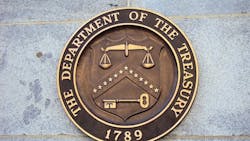While the U.S. government’s new rules may have killed the tax-inversion deal, cross-border merger activity is likely to continue unabated, analysts and traders said.
“Is this the end of inversion-driven deals? Yes, most likely,” said Kevin Smith, an equity sales trader at Makor Securities London, in an interview. “Is this the end of sizable cross-border merger activity? I really don’t think so, as the traditional rationale for such deals -- earnings accretion, economies of scale, procurement, etc. -- are still very apparent.”
New rules from the U.S. Treasury Department make it more difficult to use acquisitions as a way to move U.S. company headquarters abroad to take advantage of jurisdictions with more favorable tax rates. The rules took effect this week. The government has been tightening down on companies that use international addresses to avoid paying the U.S.’s 35% corporate income tax rate, the highest in the developed world.
Eighty-two percent of participants in a Bloomberg survey said that tax inversion-motivated mergers and acquisitions will die out after the regulations caused the collapse of Pfizer Inc.’s $160 billion agreement to combine with Allergan Plc, the biggest deal in drug industry history. The merger would have allowed Pfizer to take advantage of Allergan’s headquarters in low-tax Ireland.
Nine of the 50 traders, investors and analysts surveyed said that inversion deals would still happen. The rule is designed specifically to discourage “serial” inversions, where foreign companies combine with a number of U.S. firms and then shift their tax addresses overseas.
Total deal volume for U.S. companies acquiring firms in western European, where taxes are generally lower, fell by about a third to $34 billion in the first quarter from a year earlier, according to data compiled by Bloomberg. Deal volume globally, coming off last year’s record, declined by about 11% to $622 billion, according to the data.
Still, cross-border deals accounted for about half of that, up from about a third in the first quarter last year.
While the new Treasury rules don’t forbid inversions, it will make them more difficult, and the market is anticipating further action from the U.S. government to prove its determination to prevent these kinds of deals, said Ben Kelly, an event-driven analyst at Louis Capital Markets.
The latest version of the rules also goes after earnings stripping, the practice of moving profits out of the U.S. into low-tax jurisdictions by paying interest to a parent company in another country, a tougher stance than an older proposal, he said.
About the Author
Bloomberg
Licensed content from Bloomberg, copyright 2016.
